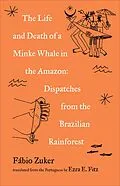As the Amazon burns, Fábio Zuker shares stories of resistance, self-determination, and kinship with the land.
In 2007, a seven-ton minke whale was found stranded on the banks of the Tapajós River, hundreds of miles into the Amazon rainforest. For days, environmentalists, journalists, and locals followed the lost whale, hoping to guide her back to the ocean, but ultimately proved unable to save her. Ten years later, journalist Fábio Zuker travels to the state of Pará, to the town known as "the place where the whale appeared," which developers are now eyeing for mining, timber, and soybean cultivation.
In these essays, Zuker shares intimate stories of life in the rainforest and its surrounding cities during an age of raging wildfires, mass migration, populist politics, and increasing deforestation. As a group of Venezuelan migrants wait at a bus station in Manaus, looking for a place more stable than home, an elder in Alter do Chão becomes the first Indigenous person in Brazil to die from COVID-19 after years of fighting for the rights and recognition of the Borari people.
The subjects Zuker interviews are often torn between ties with their ancestral territories and the push for capitalist gain; The Life and Death of a Minke Whale in the Amazon captures the friction between their worlds and the resilience of movements for autonomy, self-definition, and respect for the land that nourishes us.
Autorentext
Fábio Zuker is the author of The Life and Death of a Minke Whale in the Amazon. A writer and journalist, he holds a master's degree from the School for Advanced Studies in Social Sciences in Paris and is a PhD candidate in Social Anthropology at the University of São Paulo. He has also been three times a Pulitzer Center grantee. As a journalist he is a frequent contributor to Thomson Reuters Foundation and InfoAmazonia who has written for National Geographic, Revista Piauí, Le Monde Diplomatique Brasil, Agência Pública, and Nexo Jornal, among others. He is also the author of On an Escape Route: Essays on Writing, Fear, and Violence (Hedra Editions, only available in Portuguese). In recent years he has focused his research on stories of the Amazon rainforest, looking to write "nearby" the people whose land is being destroyed and their approaches to resistance.
Inhalt
Contents
Introduction: Writing as the Projection of Worlds
A Forest in Flames
Brazilians and Venezuelans: A Chronicle of Hatred and Compassion
The Life and Death of a Minke Whale in the Amazon
An Afternoon with Venezuelans at the Manaus Bus Terminal Overpass
The Self-Demarcation of Tupinambá Indigenous Land in the Lower Tapajós River Basin
Anamã: Six Months Under Water, Six Months on Dry Land
"What They Really Want Is to Kill Us": Violence and Destruction in a Mega-Açaí Farm in Pará
The Poison Fields
"Nature Herself is Drying Up": A Quilombo on the Island of Marajó Feels the Impact of Rice Paddies Amid Turbulent Times
The Kumuã of the Upper Rio Negro and the Decolonization of Indigenous Bodies
Between the Festival and the Fight: The Life of the First Indigenous Person in Brazil to Die from COVID-19
Epilogue: Writing Nearby
